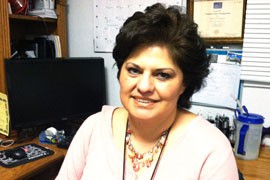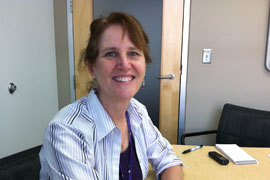Cronkite News has moved to a new home at cronkitenews.azpbs.org. Use this site to search archives from 2011 to May 2015. You can search the new site for current stories.
Rural hospitals get lift from University of Arizona center
BENSON – Teresa Vincifora, chief nursing officer at Benson Hospital, received a second role in April overseeing quality assurance. That was after recruiting to replace a retiring employee came up empty.
“In rural hospitals, we wear many hats,” Vincifora said. “Jobs are really hard to fill.”
Then a program administered by the University of Arizona provided funds for her to attend a quality directors’ boot camp in Nashville.
“We don’t have the resources that large hospitals do, so that was just such an opportunity for me and so helpful,” she said. “There’s so much to learn. It got me fired up for the position.”
The Center for Rural Health, part of the Mel & Enid Zuckerman College of Public Health, has been helping hospitals in those kinds of ways for 25 years. Vincifora’s assistance came from the center’s Flexibility Program, called “Flex” for short, established by Congress in 1997 to address the disparity in Medicare reimbursement between urban and rural hospitals.
Rural hospitals face challenges such as staff shortages, keeping up with technology and even attracting patients who choose to drive to a bigger city.
Arizona has 14 facilities designated as critical access hospitals – facilities with 25 or fewer beds located at least 35 miles from another hospital – that benefit from the federal funds available through Flex.
“Keeping them open is the biggest challenge; some are in trouble,” said Jill Bullock, rural health services coordinator at Flex. “If a community loses a hospital, that’s a big loss. We try to support them in any way that we can.”
Because these smaller hospitals have many of the same costs as larger hospitals and are tied to the same regulations without having the same volume, they get 101 percent of Medicare reimbursements, according to Bullock.
“The biggest thing right now is electronic health records – they’re very, very expensive,” she said.
Flex offers grants, training courses, networking opportunities and consultants to improve the quality of health care and hospitals’ financial and operational performance.
Health care reform makes this year particularly critical, said Tracy French, chief financial officer at Page Hospital. She asked the center questions regarding a federal matching program.
“They provided an expert to all critical access hospitals, an hour of legal advice. It was great assistance,” French said. “It’s really helping small facilities negotiate a tough environment.”
At Southeast Arizona Medical Center in Douglas, Annie Benson, who’s in charge of quality management and regulatory compliance, said the center offers advice, training and funding that make her job easier.
“They provide resources and contacts. If they don’t know the answer, they will get it,” she said.
One answer that’s hard to come by, though, is how to persuade health care professionals to work in rural hospitals, like Polacca’s Hopi Health Care Center.
“It’s a continuous problem because it’s out in the middle of nowhere,” said Jim Driving Hawk, director of field operations at the Indian Health Service in the Phoenix Area Office.
He asked Flex to hold a cost reports workshop for Hopi and the Parker Indian Health Center.
“It was a positive experience,” Driving Hawk said. “I will continue to use their resources.”
In Benson, hospital workers as recently as 2001 shared a dialup modem to download email, according to John “Rob” Roberts, director of IT. Now the hospital has updated records electronically ahead of federal deadlines. Some grants from the center have gone for software purchases.
“We’d be a lot worse off, but we’d have struggled through without them,” Roberts said. “It’s easy for critical access to get forgotten about. The Rural Health Center has been instrumental in conveying our needs to the state and federal government.”
Denise Hurtado, Benson’s CFO, is using Flex to get data about why people are bypassing the hospital and driving an hour to Tucson.
“One concern is to keep as many patients here as possible,” she said.
Hurtado said she appreciates the Flex training grants and tries to spread each year’s allocation to a different department. The webinars on Medicare, Medicaid and new coding requirements help, she said.
Meanwhile, Jill Bullock is confident that Arizona residents living in rural areas have adequate access to health care.
“There are enough hospitals,” she said. “But the hospitals don’t have marketing departments, and the services might be right in their backyard and people are not taking advantage of it.”








